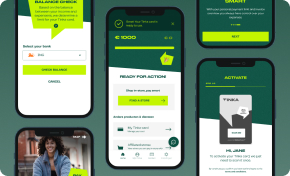How software developers may make a difference by using green coding
The software industry is one of the most significant in terms of creating jobs and boosting the economy due to rising digitalization & automation. But a lot of times, this expansion is at the cost of the environment. One of the sectors with the highest energy use is IT. One of the main sources of its emissions is greenhouse gases.
It is crucial for software professionals to address sustainability in order to solve this problem. Sustainability is a notion that incorporates social & economic factors in addition to environmental factors. It is built on the triple bottom line concept, which has the social, economic, and environmental foundations as its three main components. Sustainability, then, refers to an industry’s or business’s commitment to social responsibility in addition to economic success.
This implies that software businesses need to focus on more than just the effectiveness of their apps. But also to how they affect society and the environment. It’s important to take environmental, economic, and social factors into account equally. And to consider how one’s own job affects the triple bottom line.
Your Path to Innovation Starts with Digital Transformation
Customized Digital Strategies for Competitive Advantage
Explore Digital TransformationThe environment is greatly impacted by the information technology sector.
An estimated 2% of the world’s CO2 emissions are attributed to the IT sector. It essentially equates to emissions from air travel. Additionally, in recent years, the power needs of the IT sector have grown dramatically, when more and more gadgets and programs are put into use. The rise in energy use is also largely attributable to the move toward cloud computing & data centers.
Excessive resource usage in the IT industry is another issue. Raw materials like metals and plastics are needed to create products like smartphones, computers, and other electronics. They are frequently mined in hazardous working environments. Electronic device disposal is another issue because it frequently results in improper recycling and environmental contamination. This is another reason why we always recycle properly our outdated devices.
In the IT sector, lasting solutions are required to address these issues. The creation of applications is where it all begins. Here, energy consumption and CO2 emissions can be decreased through effective programming, the use of renewable energy sources, and ecological considerations during the development of applications. Reducing the number of resources used by the IT sector also requires the use of recycled materials in equipment manufacturing and improved recycling infrastructure.
The importance of software practitioners being aware of these issues and educated on sustainability follows. They can aid in the creation of more sustainable solutions by increasing their knowledge and abilities. They can improve environmental sustainability throughout the IT sector, and this is another important focus we share with our colleagues, partners & employees.
IT Consultancy Designed Around Your Business Objectives
Expert Guidance to Optimize Your Technology Strategy
Discover IT ConsultingHow much electricity is used by your software?
The fact that most electricity is still produced by burning fossil fuels means that it is not a clean energy source (primarily coal and gas). Software that uses less electricity is therefore more environmentally friendly because it won’t indirectly utilize as many fossil fuels. Learn more about How To Create a Mobile App on our blog, where we detail all the steps of this process.
Obviously, the software requires electricity at some point. Take into account how much electricity your software consumes in terms of carbon. The weather & the time of the day have an impact on the fluctuation of renewable energy. Make your software use electricity when there is a plentiful supply of renewable energy. Carbon intensity APIs can help with this.
But, switch to your app’s eco-mode to consume less electricity when renewable electricity is short or when demand exceeds supply. You can achieve this by providing your users the option to switch or, in a more assertive decision, by ignoring their request for a choice and carrying out the change automatically.
How much hardware is needed by your software?
The hardware that your software works on is another way to examine resource efficiency. Embedded carbon, which makes up a significant portion of a device’s lifetime carbon emissions, is the carbon required to produce and ship a smartphone, laptop, or desktop computer.
The environment will benefit more from these devices having a longer lifespan. Software that can run on all hardware and doesn’t necessitate the most cutting-edge gear is therefore better for the environment versus software that would encourage customers to purchase new hardware since their current devices are inefficient.
Nonetheless, it’s preferable to maximize utility for data servers. Even when servers aren’t in use entirely, they continue to use electricity and incur carbon costs. One server operating at total capacity is preferable to four servers running at only 25% of their capacity for the environment. Find out All You Need To Know About Cloud Computing on the blog.
The last component of resource efficiency is networking. Servers, routers, and switches all have an impact on the environment due to the carbon they contain & the electricity they use. Indirect carbon emissions are caused by the data you send & receive across the network. So try to make an effort to reduce the volume and distance of your data packs.
Sustainable software development with green coding
Environmental considerations are incorporated into the software development process under the phrase “Green Coding.” Creating software that is resource-efficient and sustainable is the aim of green coding. Thus, less energy is used and less CO2 is released. The term “green coding,” however, also means the whole development process, which includes the creation, implementation, and upkeep of programs. It entails incorporating resource optimization, eco-friendly methods, and energy efficiency into the development process. Dive deeper to discover Why Sustainability in Software Development is Important on our blog.
Experience Our Research & Development Expertise
R&D-Led Software Development Integrates Innovation into Every Product Detail
Learn About R&D ServicesGreen coding refers to the application of effective algorithms that consume less processing power and energy. A different option is to maximize the energy efficiency of applications by lowering processing power. Renewable energy is another aspect of green coding that is applied in data centers. To operate and keep servers and networking equipment cool, data centers need a lot of energy. Data centers can lessen their carbon footprint, as well as help in the energy transition by utilizing renewable energy sources like solar or wind power.
The advantage of using green coding
Consumers are increasingly choosing sustainable goods and services as a key consideration in their purchasing decisions. It can facilitate:
- Using resources more effectively can cut expenses and increase profit margins
- By boosting employee motivation and providing a desirable work environment, you can draw in and keep talent
- By presenting itself as a trustworthy and creative organization, it may deepen links with clients & business partners, as well as create new prospects
- Enhancing the company’s reputation to increase brand recognition and customer loyalty
Custom Software Perfectly Aligned with Your Strategic Objectives
Software Solutions that Fit and Enhance Your Business Strategy
Explore Custom SoftwareEducation possibilities for software professionals in green coding
Software businesses must increase their knowledge in order to support sustainable software development. Software professionals have access to a variety of training opportunities to expand their knowledge and sharpen their skills in connection to sustainable software development.
E-learning programs with an emphasis on sustainable software development are one choice.
These programs, which can be provided by a range of organizations, typically present theoretical concepts. Also, software professionals can go to conferences and workshops to exchange experiences and learn about the most recent advancements in sustainable software development. These gatherings might provide excellent chances to connect with other specialists and get fresh insights.
The road to sustainable software engineering is paved with numerous gradual steps. Although there is no imminent need to highly alter how you create software, it is crucial to at least take sustainability into account when building new software solutions for other companies.
Start a conversation with yourself. If you can reduce the size of your code and use a greener server design, consider whether the additional database queries are worth the carbon emissions they produce. Be mindful.
These might seem insignificant in the context of climate change, yet everybody has a role to play in finding a solution. We can create a world in which the software we build does not unfairly burden the stunning ecosystem of our planet if we all work together towards the same goal.
Enhance User Experience with Our UX/UI Design Services
Crafting User-Centered Designs That Enhance Engagement and Maximize Conversions
Discover UI/UX DesignAt HyperSense we do our best to keep the coding green and our planet clean. We use eco-friendly methods in our entire software development process, from the new equipment that preserves the batteries of our laptops to the AWS CDK serverless cloud service and even providing our own electricity through solar panels. Discover more about who we are, what we do, and how we can help your business by building sustainable software solutions for you too. Contact us to share your idea for a mobile or web app and let’s create together something great!










